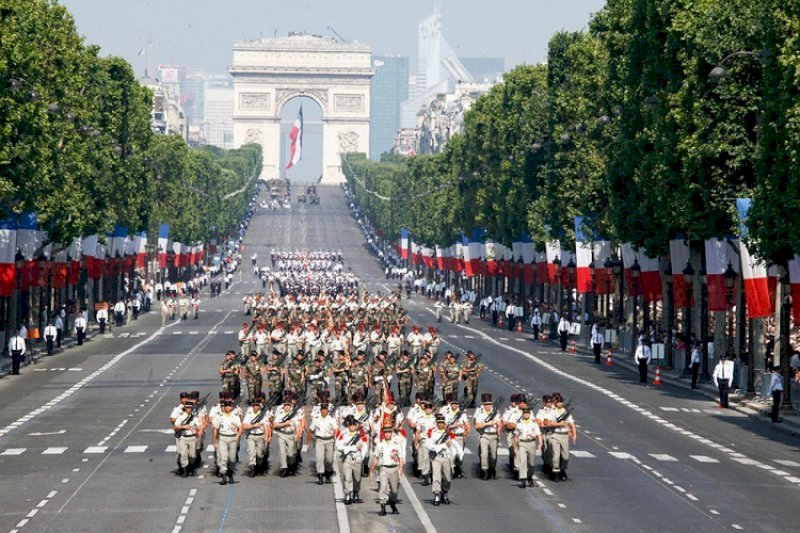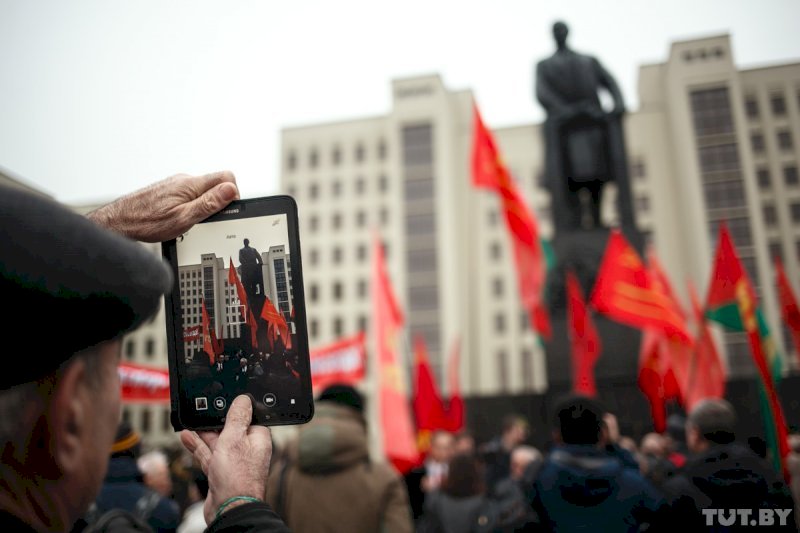Belarusian ‘Historian’ Needs To Be Explained One Important Thing
- Dzmitry Rastayeu
- 7.11.2019, 17:16
- 5,180

Why November 7 in Belarus is not at all the same as July 14 in France.
Belarus is the only country in the world where the October Revolution of 1917, which brought death and grief to millions of people, is still considered a holiday. It is as if the Spaniards would celebrate the beginning of the 1936 civil war, and the Germans - Hitler's rise to power. Even in Russia they stopped celebrating this date, realizing that it is insane to call a holiday a day that laid the foundation for the spiritual and physical extermination of the nation.
Here, some nervous guy with three classes of education, and an after-school classes from the Belarusian Television, usually begins to fiercely gesticulate and refer to the French celebrating the Bastille Day. We will have to disappoint him: the French do not celebrate any Bastille Day. They would be very surprised to learn that this erroneous opinion still exists in the countries of the former USSR.
The French celebrate the National Day - La Fête Nationale - this is its official name, and it is by no means connected with the Bastille. It was connected with that mess in the Soviet era by the communist propaganda, which romanticized the French Revolution. In fact, the main holiday of France goes back to a completely different event.

After the revolution began, King Louis XVI did not suppress it by force, he did not recognize it, preferring to sit out at Versailles, expecting that somehow everything would resolve itself. It didn’t. Following the riots and pogroms, famine quite predictably broke out. Chanting “Bread! Bread!”, the crowds of angry Parisians rushed to Versailles.
Louis was returned to Paris, where, with enthusiastic cries of “Long live the king!” they proposed signing the “Declaration of Rights of Person and Citizen”. The signature was put, and this moment was considered the unity of the nation and the crown, after which royal white was added to the colors of revolutionary Paris - red and blue. Thus the national flag of France that we know today was born.
On July 14, 1790, according to the royal decree, celebrations were held on the Field of Mars, called the National Day, which was subsequently fixed by the term Holiday of the Federation and Unity of the Nation. Ironically, this happened on the same day as the fall of the Bastille the year before. During the celebrations, a military parade and feast took place, salute was given. About 100 thousand people who came from all over the country took part in the festivities.
True, after some time, the base instincts of the masses prevailed, and what began, in fact, is associated today with the French Revolution: blood, horror, terror, mass atrocities, famine again, and blood-spilling again.
But July 14, 1790 - although it is chronologically included in the revolutionary ten-year period - was remembered as a good and hopeful day. In 1880, it finally secured the status of the main holiday of France, so that the French celebrate not the beginning of a revolution that brought blood and grief to the country, but one of its few bright moments - the birth of the national flag, the adoption of the “Declaration of Rights of Person and Citizen” and the triumph of uniting all residents of the country into a single nation.
La Fête Nationale is celebrated precisely as the day of freedom and independence of the French people, as the beginning of a new France, where everyone has dignity, rights and freedoms that no one should infringe.
And what are we celebrating on November 7? The beginning of an era that destroyed the elite of the Belarusian nation and undermined its spiritual roots?
If we draw an analogy with France, our national holiday should not be November 7 — a shameful and damned date — but March 25, Freedom and Remembrance Day of the independence of the Belarusian People’s Republic in 1918. But our country is ruled by a “historian”! He knows best of all about Bykau’s poems, and about Skaryna living in St. Petersburg, and about November 7, which for him is “a celebration of peace and true human rights.”
It’s time someone explains an important thing to the Belarusian “historian”. There is a categorical difference that does not allow putting the French and October revolutions at the same level, and even more so connecting the latter with peace and rights.
The French Revolution (in France itself, by the way, is not called Great) brought the French many troubles, but did not destroy their culture and did not undermine the spiritual roots of the nation. Moreover: paradoxical as it sounds, France emerged from the revolutionary crucible as a truly renewed, democratic country. Yes, the methods of the revolutionaries were terrible and unacceptable. But their ideals and goals were in tune with the challenges of the time and the logic of the development of civilization.
The humanistic principles formulated in the “Declaration of Rights of Person and Citizen” - “people are born and remain free and equal in rights”, “freedom consists of the ability to do everything that does not harm others”, “no one should be persecuted for their opinions”, “Free conveyance of thoughts and opinions to others is one of the most precious human rights”, etc. - lie today at the heart of any civilized society.
The October catavasia set as its goal a phantasmagoric utopia, the construction of an ideal “new world”, and therefore was initially doomed to failure. Moreover, the Bolsheviks borrowed methods from the French revolutionaries, but not goals - the practice of terror, but not the idea of human rights. So before collapsing, this utopia for the whole 70 years plunged into the abyss of blood and fear the nations that fell under its moloch.
From this nightmare they all came out disfigured and devastated. Some were so distorted spiritually and physically that they still cannot recover. And someone is not allowed to recover, they are forced to continue to build a utopian madhouse - with pathos chatter instead of real achievements, chronic lies from everywhere, and violation of all “untrue” rights.

November 7 - the “red day of the calendar" - is a cynical spit in the face of the victims of the Soviet pandemonium. Celebrating this day means committing a crime against reason, memory and dignity. But it is also a spit in the future, a crime against the good of children and grandchildren.
After all, every year spent under the power of utopia is a year stolen. And the longer the utopian backbones are supported, the more forces will have to be given to the children to dismantle them.
Dzmitry Rastayeu, Solidarity








